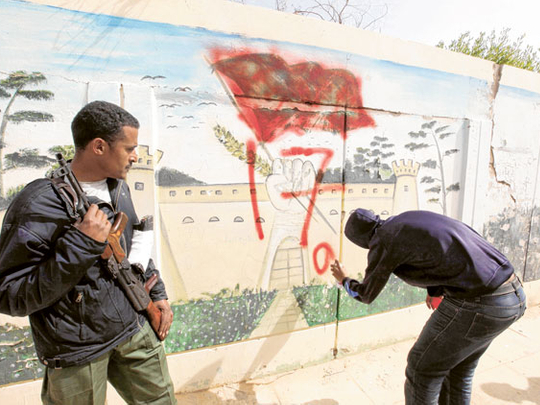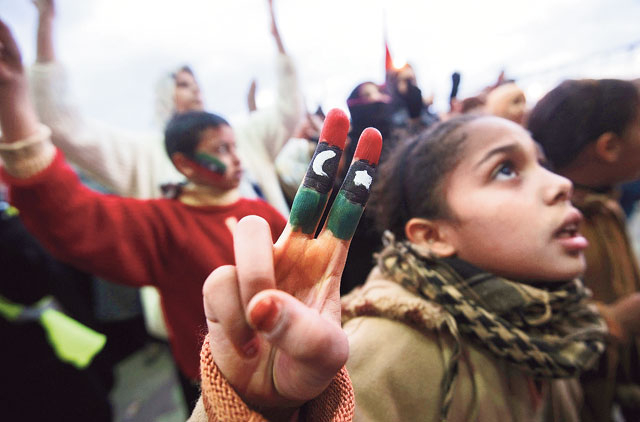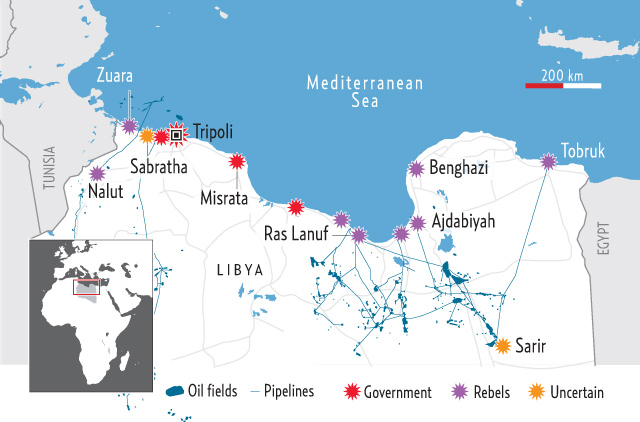
Benghazi: There is talk of a no-fly zone being imposed over this vast land. The Arab League are backing the call, the UN may sanction it, Nato may enforce it. That is welcome news if it happens.
What must not happen is any foreign soldier setting foot on the soil and sand of this vast land, freed Libyans say in unity.
Already, a couple of British special forces men have been detained and released, presumably in an attempt to make contact with the military leadership of the anti-Gaddafi forces.
They left, a few days ago, aboard a royal navy frigate, their escapade having seemingly backfired.
In talking to many here over these past two weeks, all are determined that Libyans alone will sort out Libya's problems. They are all too aware of the riches in oil under the sand of this vast land — and they are all too aware that any foreign power, super or otherwise, will kill — literally — to get its hand on a share of those resources.
After three weeks of revolution, Libya's oil production facilities remain intact, each side carefully ensuring that they are not destroyed during fighting. Small arms are used when the battle comes too close to such production facilities — almost an unwritten rule between the combatants.
What is clear in the battles of these past weeks is that the rebels do not have the ability now — as long as Colonel Muammar Gaddafi has jets and pilots willing to bomb his own people — they are destined to battle to a stalemate.
If a no-fly zone takes effect, then rebels can take heart. But what of the mindset of a man who is so eager to cling to power that he will unleash fighter jets against his own people?
When the diplomats sit down at the UN, they need to formulate a plan of what to do with the Colonel.
The prevailing sentiment within Free Libya is that he should be strung from the nearest lamppost.
Consequences
While that lynching may appease the people of Libya over whom he has so brutally ruled these past 42 years, it does little to answer the many questions of nations who have had to suffer the consequences of his actions and support for terror during his years.
Somewhere, in a farmyard in Northern Ireland there is a shipping container buried under the ground. It has been sealed with cement, with three respected international jurists from around the world satisfied that the arms there are beyond use. There is a second such container similarly buried in the Republic of Ireland too.
Those containers were sealed as part of the Good Friday Accord, which ended three bloody decades of political and sectarian violence in Northern Ireland — the arms and ammunition supplies of the Irish Republican Army (IRA), which has renounced violence.
The containers hold hundreds of AK47s, tens of thousands of rounds of ammunition, pistols from the former Yugoslavia and RPG launchers and rounds.
In his dabbling and support of terrorist causes around the world, Gaddafi was a benevolent donor of the goods of war, supplying a host of terrorist organisations from the IRA to ETA, the Basque separatist group, with weaponry. In the sands of the vast land, Gaddafi provided training camps where terrorists could hone their bomb making and killing skills. He willingly supplied Semtex — a highly effective plastic explosive — to terrorists, used to devastating effect against innocent shoppers at Harrods, innocent cafe-goers in Madrid.
Between his bombs and his bullets, his training and his technical support, Gaddafi has the blood on his hands of Libyans, French, Irish, British, Spanish and American.
His fingerprints are on the bombing of PanAm over Lockerbie in 1988. How conveniently then, that a host of western leaders had visited Tripoli in these past few years. Tony Blair, Sergio Berlusconni, Paul Martin — all choosing to ignore Gaddafi's actions and deeds against innocent people, shaking hands with a bloodied fist.
When Libyans see this, and having lived under that bloodied fist of the Colonel for so long, it's not difficult to see why they are vehemently opposed to any foreign soldier setting foot on Libyan soil. Given the international community's willingness to forget, maybe there is something to be said for finding the nearest lamppost after all.














